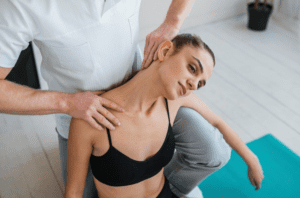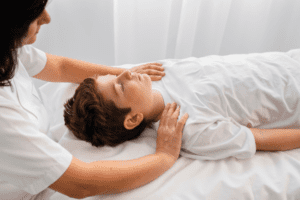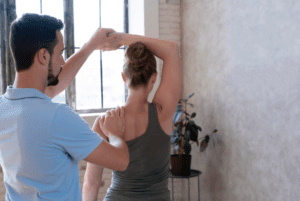Table of contents
- Why You Might Feel Sore After Massage?
- Causes of Post-Massage Soreness and Muscle Pain
- Tips to Prevent and Relieve Soreness After a Massage
- Book Your Next Session
- When to Be Concerned About Persistent Pain After Massage
- Finding Licensed Massage Therapists in Vancouver
- Best Vancouver Hotel With Spas for Massage Treatments
- Last Words
- FAQs
You just treated yourself to a well-deserved massage to relieve your tight muscles and rejuvenate your mind. But now you find yourself sore and achy the day after. Soreness after a massage is actually quite common and nothing to worry about. Your massage therapist worked your muscles deeply to loosen knots and increase circulation.
Now your body is adjusting to the effects, causing some tenderness and discomfort. While the soreness can be annoying, the good news is there are some simple things you can do to relieve your achy muscles and get back to feeling relaxed and recharged again.
A few remedies, some rest, and staying hydrated will have you back to your pre-massage bliss in no time. Massage therapy reduced muscle soreness and increased muscle function following eccentric activity, according to a study published in the Journal of Athletic Training in 2014.
Why You Might Feel Sore After Massage?
It’s crucial to clarify that experiencing soreness following a massage doesn’t necessarily indicate its effectiveness. The common misconception that a massage must induce pain to prove its effectiveness is entirely false. The outcome depends on several factors, including the pressure applied by the RMT and the type of massage.
Post-massage soreness is more likely after a deep-tissue massage. During this treatment, the RMT works to alleviate knots, tightness, and discomfort by stretching the muscles. Consequently, some discomfort afterward is possible, depending on the severity of the initial muscle tension.
Sometimes after a massage, your muscles can feel a little sore or tender. This is totally normal and nothing to worry about. You may ask yourself, “Why am I sore after a massage” So here are some reasons why you might feel sore and what you can do about it:
Built-Up Tension Release
When a massage therapist works out knots and tight areas in your muscles, it can cause slight soreness. Your muscles have been holding tension and strain for a long time, so releasing all of that built-up stress at once may lead to some discomfort. The soreness is temporary and a sign your massage was effective!
Increased Circulation
Massage increases blood flow to your muscles. This improved circulation brings more oxygen to your muscles and helps flush out metabolic waste products. The influx of blood flow and resulting inflammation can cause mild soreness that usually only lasts a day or two.
Deep Tissue Work
Deeper techniques like trigger point therapy or myofascial release work directly on tight, adherent areas of tissue and muscle fibres. This intensive massage can lead to soreness that may last 3-5 days before resolving. The soreness is a normal reaction that shows the massage reaches deeper layers of muscle.
To relieve any soreness from your massage, rest as much as possible, apply ice or heat, take an over-the-counter pain reliever, and drink plenty of water. Gentle stretching or walking can also help. If soreness persists for more than a week or is severe, contact your massage therapist. They can evaluate if any adjustments need to be made for your next massage.
While soreness is common and usually nothing to worry about, let your massage therapist know right away if you have any sharp or shooting pain, or pain that gets worse over time. They want your massage to be a positive experience and will make any necessary changes to ensure your comfort and safety.
Also Read: Types of Massage Therapists
Causes of Post-Massage Soreness and Muscle Pain

Massages are meant to relieve tension and pain, but it’s common to feel sore after massage treatments. Here are some of the main reasons why and what you can do about it:
1. Muscle Soreness
When a massage therapist works out knots and tension in your muscles, it can lead to microscopic tears in the muscle fibres. This causes inflammation that leads to soreness. Icing the area, taking an over-the-counter pain reliever, and resting the muscle can help reduce this soreness.
2. Toxins Released
Massages help loosen toxins trapped in your muscles and connective tissue. When released, these toxins can cause soreness until flushed out of your body. Drinking plenty of water helps speed up this detox process and provides relief.
3. Circulation Changes
Massages increase your circulation, bringing more oxygen to your muscles. This can lead to soreness that usually only lasts a day. Light movement like walking or gentle yoga helps keep circulation flowing without further irritating your muscles.
The soreness from a massage is usually minor and short-lived. Staying hydrated, icing any particularly sore areas, taking an OTC pain reliever if needed, and doing light movement will have you feeling back to normal quickly. If the pain is severe or persists for more than a few days, contact your massage therapist. They can evaluate if there are any underlying issues and provide guidance for recovery.
While feeling sore after massage treatments can be frustrating, try to view it as a sign your body is healing and rebalancing. With a few days of self-care, your muscles will be reaping the benefits of your massage.
Tips to Prevent and Relieve Soreness After a Massage
Prior to discussing steps to alleviate post-massage soreness, it’s crucial to emphasize that if you ever experience significant pain during your massage, you should promptly inform your Registered Massage Therapist (RMT). Massage should not intensify your discomfort; clear communication is essential during and after the session. If your muscles continue to ache beyond typical soreness, don’t hesitate to inform your RMT to enhance your future treatments.
If you want to avoid feeling sore after your massage and get some relief from any discomfort you might be experiencing, try these tips:
1. Hydrate and stretch
Drink plenty of water after your massage to rehydrate your muscles. Gentle stretching and light exercises like walking can also help reduce stiffness.
2. Apply ice or heat
Ice packs reduce inflammation while heat relaxes tense muscles. See which provides the most relief for you. Wrap ice or heating pads in a towel and apply to sore areas for 10-15 minutes at a time.
3. Get extra rest
A massage can be physically demanding, so extra rest allows your body to recover. Try to schedule your appointment before a day off work or on a weekend when you have minimal commitments.
4. Use over-the-counter pain relievers
For persistent soreness, an OTC medication like ibuprofen or acetaminophen may provide relief. Follow the dosage instructions and don’t take them on an empty stomach.
5. Elevate and compress
If your massage focuses on your legs or lower body, elevate your legs while sitting and apply compression socks or bandages. This reduces fluid buildup and eases discomfort from increased circulation.
6. Take a bath
Enjoying a bath can be an excellent method to relax your muscles and promote overall relaxation. Enhance your bath by adding Epsom salts, which can reduce inflammation and improve circulation, aiding in the prevention and management of post-massage soreness.
7. Ensures a restful night’s sleep
Sleep plays a vital role in the body’s healing process. Given that massage therapy can enhance sleep quality, scheduling a massage when you can follow it with relaxation is ideal. The goal is to extend the relaxation of your muscles after the massage, so allowing time for rest afterward is highly beneficial.
Book Your Next Session

Regular massage treatments yield the best results for your body. Picture a muscle that starts out tight and painful but relaxes with a massage. Without consistent attention, it may return to its initial state. However, with ongoing care, it will maintain relaxation longer due to muscle memory.
The soreness you feel after a massage is a sign your muscles have been worked. While uncomfortable, it’s a normal reaction and will subside within a couple of days. Using a combination of rest, hydration, heat/ice, and OTC medication should relieve your discomfort. Be sure to communicate with your massage therapist about any soreness so they can adjust the pressure and focus for your next appointment.
When to Be Concerned About Persistent Pain After Massage
While soreness after a massage is common and usually nothing to worry about, persistent or severe pain could indicate an underlying issue. If your discomfort lasts more than a couple of days or is intense, it’s best to consult your massage therapist or doctor.
1. Muscle Strain
An overly vigorous massage could strain your muscles, tendons or ligaments. Strains cause sharp pain and swelling. Apply ice for 10-15 minutes several times a day to reduce inflammation. Take an over-the-counter pain reliever if needed. Gentle stretching and heat may help after 48 hours. See a doctor for severe strains.
2. Nerve Impingement
Deep tissue massage in areas like the neck or lower back could irritate nerves. You may feel pain, numbness or tingling radiating from the massage site. Apply ice and rest the area. If symptoms don’t improve in a week or so, consult your doctor. They may refer you to a physical therapist who can properly assess any nerve impingement.
3. Underlying Condition
An intense massage could aggravate an existing condition like fibromyalgia, arthritis or muscle spasms. Or the massage may have revealed an issue you were previously unaware of. See your doctor right away for an accurate diagnosis and treatment. They can determine if massage therapy should be continued or modified.
In many cases, the underlying cause of persistent pain after massage is minor and will improve with self-care and time. However, you know your body best. Don’t hesitate to call your massage therapist or doctor if you have concerns or if your pain feels unusual or severe. They can properly assess your situation, determine the cause of your discomfort and recommend appropriate treatment so you can get back to enjoying the benefits of massage therapy.
Finding Licensed Massage Therapists in Vancouver
Finding a licensed massage therapist in Vancouver is key to getting the relief you need without worry. Look for therapists with proper certifications and experience in the techniques you’re interested in.
Ask for Recommendations
Talk to your doctor or friends who regularly get massages. They may know of skilled therapists they can personally recommend. Get references and check online reviews from other clients regarding their expertise, professionalism, and ability to provide a pleasant experience.
Check Qualifications and Licensing
In British Columbia, registered massage therapists (RMTs) have completed a 2-3 year massage therapy program and passed a licensing exam. Only consider RMTs or therapists with equivalent certification. Ask about their training, experience, specialties, and techniques to find someone suitable for your needs.
Consider Gender
Some clients prefer a therapist of the same gender. If that is important to you, look for clinics or spas that have both male and female RMTs on staff. You want to feel completely comfortable during your treatment.
Discuss Techniques
Tell the therapist about your soreness or pain points. Ask which massage techniques may provide relief, like Swedish, deep tissue, trigger point or neuromuscular. A skilled RMT can personalize your session using a combination of modalities based on your condition and preferences.
Ask About Rates and Billing
RMTs in Vancouver typically charge between $60 to $120 per hour. Inquire about the rates for your desired treatment. Also, ask if direct billing to your extended health insurance provider is available. Some clinics and luxury spas may charge higher rates, especially if a pool, hot tub or other amenities are included.
With some research, you can find an experienced massage therapist in Vancouver to ease your soreness and help you feel relaxed and rejuvenated. Be sure to communicate your needs upfront so you get the most out of your massage therapy.
Best Vancouver Hotel With Spas for Massage Treatments
When your muscles feel sore after massage treatments, it’s usually a sign that your therapist did some good deep tissue work. While the soreness can be uncomfortable, it will subside within a day or two.
Spa Utopia in Vancouver is the perfect place to indulge in some much-deserved self-care in the form of a therapeutic massage. Our knowledgeable massage experts team is here to address your inquiries and get you ready for your next massage. Reach out to a nearby location to schedule your appointment today.
Last Words
In conclusion, experiencing muscle soreness following a massage is normal and is not indicative of an ineffective treatment. It’s normal for this to happen when your muscles repair and loosen up. You may get the most out of your massage and feel less sore the next day by drinking plenty of water, taking it easy, and discussing your needs with your therapist. Don’t let a little discomfort prevent you from experiencing the many advantages of massage therapy.
Visit the North Vancouver massage therapists if you’re in search of a professional, and think about booking a room at a Vancouver hotel with spa if you really want to unwind.
FAQs
Soreness can occur due to the release of built-up tension in your muscles, increased circulation, and deep tissue work during the massage. It’s a sign that the massage is effective and usually temporary.
To relieve soreness, stay hydrated, apply ice or heat, get extra rest, use over-the-counter pain relievers if needed, and gently stretch. Communicate with your massage therapist about any discomfort.
If pain persists for more than a few days or is severe, consult your massage therapist or doctor. It could be due to muscle strain, nerve impingement, or an underlying condition.
Ask for recommendations, check qualifications and licensing, consider gender preferences, discuss techniques, and inquire about rates and billing to find a suitable therapist.
Look for a hotel with spa amenities such as Spa Utopia that offer massage treatments to enhance your relaxation and rejuvenation experience in Vancouver.





